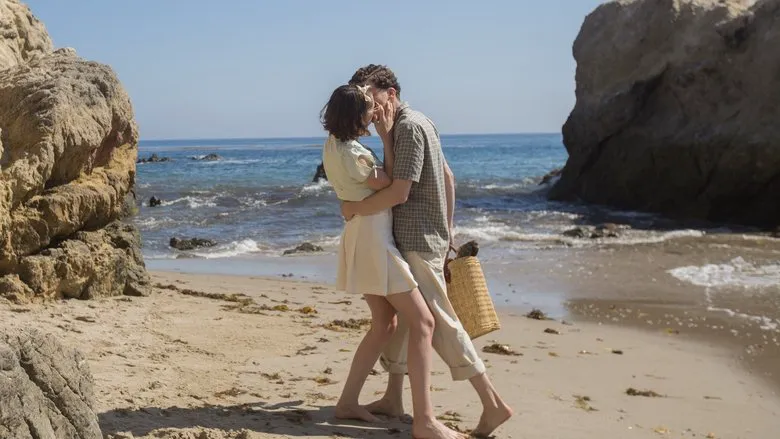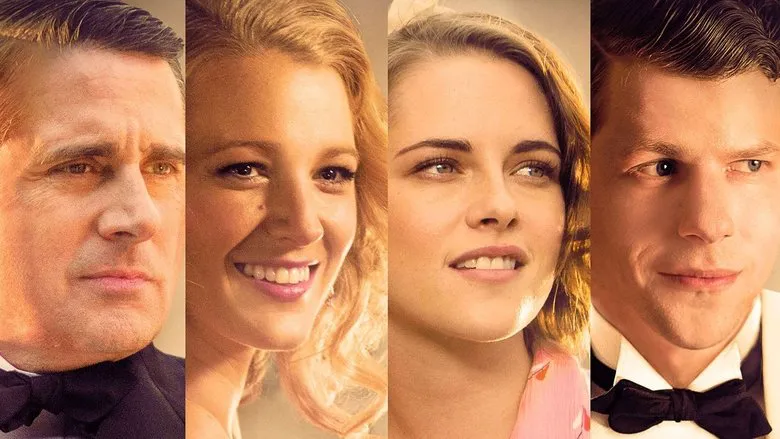Like many of Woody Allen’s recent films, “Café Society” is a charming trifle, pleasing only to the eye. You won’t find anything for the heart or mind in this movie. It’s an empty shell.
Synopsis
In the 1930s, Bobby, the younger son of a not-so-successful New York shopkeeper, arrives in Los Angeles to enter the world of cinema with the support of his uncle, even if only as a messenger in an agency office. In his uncle’s company, Bobby meets the lovely secretary Vonnie, but alas, she is forced to reject the young man’s advances, as she has a much wealthier and more influential admirer – Uncle Phil himself. Deprived of the chance to win the girl from his relative-rival, Bobby returns to his native East Coast, but his first love never lets him go.

Behind the Scenes
The filming was marred by a conflict between the director and Bruce Willis, who was originally cast as Phil Stern. The actor behaved defiantly on set, didn’t learn his lines, and disrupted filming schedules – Allen had to hastily replace the “Die Hard” star with Steve Carell.
Woody Allen’s Recurring Themes
With each new Woody Allen film, it becomes increasingly difficult to talk about them – the old director’s rapidly produced films have long merged into one blurred picture. Even devoted fans of the director would struggle to name a dozen films made in the new century. Of course, there are differences between the films, but step aside, and the impressions of them completely evaporate. Both good and bad. Allen’s cinema has become a trinket, a kind of acting study, which is interesting to watch in the right mood, but there is no desire to comprehend it in any way.
 .jpg “Still from “Café Society””)
.jpg “Still from “Café Society””)
This is the third film in which Jesse Eisenberg and Kristen Stewart play a couple. Previously, “Adventureland” and “American Ultra” were released.
A Hollow Retrospective
It seems that the author himself doesn’t particularly bother to provide any basis for his stories. His new “Café Society” turned out to be quite empty. At first glance, the picture looks like a retro love story with a light touch of aristocracy. Allen weaves into the story a stylish atmosphere of the era of the first big movie stars. His characters live in a time when catching cranes was quite common, when you could get rich in an instant, just as you could lose a fortune in a minute. All this is interesting, of course, but only at first glance. Further on, the film breaks down into a dozen fragments, each of which is only partially interesting. And everything feels unfinished – plot lines are abandoned halfway, stories are untold, conclusions are not drawn. Allen is like many of his former characters, who don’t finish what they start.

It would be easy to imagine that such a film was made by some newcomer. If “Café Society” starred graduates of VGIK (Russian State University of Cinematography) instead of Hollywood stars, the picture could have become an impressive graduation work for some debutant. But this is Woody Allen, and accordingly, the attitude to the film should be different – he is, after all, a master. And the master laughs at everyone – at the audience, at the critics, and even, it seems, at the actors, because the characters of “Café Society” are walking clichés and cardboard exhibits of a museum of anecdotes. Here is a venerable Jewish woman who spends her life in eternal disputes and quarrels, here is a well-groomed agent who more often pretends to be cool than actually “rules the world”, here is a pretty young woman who believes in the “American dream”, here is a gangster who doesn’t care about his own cover. And on top of this cake is a simple guy who plays the second fiddle well, carries out instructions perfectly, but is not a leader in work, family, or personal life.

Actor’s Paradise
It is understandable why actors go to Allen with such pleasure – the director gives them the opportunity to “soar.” Such ease with which they play with this director is rarely found. Plus, in this particular case, Jesse Eisenberg got the opportunity to play several different guises of his character at once – from a timid newcomer to a well-groomed administrator of a fashionable club, from a stammering lover to a socialite, knocking down girls like overripe pears from branches. And Eisenberg plays with pleasure, but with pleasure for himself – the viewer is neither hot nor cold from this.
Experienced viewers have long ceased to expect revelations from Allen’s films – the director predictably “cooks” in his own small world, periodically releasing steam, not particularly caring whether you like his next work or not. And “Café Society” is no exception – an optional trinket, the whole meaning of which boils down to the banal thought that great love is not forgotten. As if we didn’t know. This is just another Woody Allen film that will be easily forgotten a week after the end of its run.